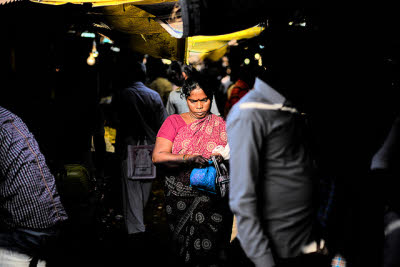by Vidya Panicker
She was loud and noisy, her mouth always filled to the brim with foul words which she would lavishly shower on anyone who offended her remotely. She was generally despised, but I liked her for reasons I cannot pinpoint. I waited on the balcony whenever her voice was heard in the lane calling out. I would watch her coal dark figure, clad in a dirty but shimmering saree, shaking her ample bosom and firm buttocks, slithering in and picking the garbage bags left at the doors of every house in the street. She collected these into her pull cart, dragged it to the waste dump a few kilometers away in the outskirts of the city and dumped it. She was our local garbage collector, a job invented by the residents’ association a few years ago when they realised everyone disposed their garbage by throwing it into their neighbours’ property.
Some called her a “loose” woman, but I had seen her bad mouthing any man who ogled at her.
“Don’t you have a wife at home you bastard?” she asked them.
She always smiled at me. I believed it was because my wife paid her five rupees extra during festivals, packed and gave her our left-over food from the previous day and because most of those shining sarees she wore had once belonged to my wife. My assumptions were only partly correct.
The woman lived in the poor people’s lane (as we called it), which ran parallel to ours. We were the rich people, of course. People who had waste that needed to be picked by the poor ones. I sometimes walked that way for creativity sparks, but mainly to rid myself of the sound of T.V playing. Imagine how T.V. has become so much a part of our lives now! We invite guests over, and then watch the T.V along with them. The fun of festivals are now measured by how fresh the movie shows are, on each channel. My daughter refuses to open her mouth unless we turn on the cartoon channel. It gets on my nerves at times, as it did on that day. The poor people’s lane smelled bad, of excreta, rot, unwashed bodies, poverty and desperation. I could hear babies crying and people shouting, but all real, not telecasted, which was a pleasant change. So I kept walking until a familiar voice stopped me.
“Sir, why are you here?”
I presumed that the question meant what business a filthy rich man like me, who had all comforts of life, had in this part of the town, which was largely ignored and neglected.
The garbage collector was walking towards me, a smile plastered on her face.
“Did you come to see me?” she asked.
I was so shocked that I almost confirmed she was as “loose” as many claimed her to be. I imagined the shame if the others in my locality found that I was here to see this woman. But no, that was not the case.
“Do you know anyone else here?” she continued, as if to explain the logic of her previous question.
That was a definite relief.
“I just came down for a walk”, I replied.
“My house is over there”, she pointed to the dilapidated structure, with a namesake roof of plastic sheet and gunny bags as window curtains.
“Please come and have a cup of tea”, she went on as I stood fixed, wondering how any human being could possibly live inside that arrangement.
Now, I am a socially just and kind man generally, but I cannot be expected to eat or drink in a setting as that. My reasons were not my ego or arrogance, but a minimal sense of hygiene. The whole place was shrouded in a veil of dust and dirt and there were stray dogs with pus-filled sores loitering around. Nevertheless, ignoring the hospitality of the woman would be no less than an insult to her.
“I have just had my tea, I will come in for a minute and leave”, I told her.
She nodded her understanding.
Inside her hut, which I entered by stooping as low as I could, I was surprised by how neat and tidy everything looked. Poor, but clean. Not a speck of dirt. No flies, or animals. Just one human, seated near the fireplace, grinning at me.
“My husband”, she said.
I did not know the woman had a husband. No one ever told.
“He does not live here anymore”, the woman said as if she read my thoughts.
“He left me for a younger woman there years ago, but still comes here from time to time, you know, his new wife does not have enough meat on many of her important body parts”, she said and laughed out loud. The man joined her. In all the awkwardness of the situation which I would otherwise have regarded as disgusting, I laughed too.“Shall I make some tea?” she asked again.
This time I did not have a reason to refuse. Over tea and glucose biscuits, the woman told me about her only son who is an engineering student. I was surprised again, because he studied in the college where I taught, and was in my second year class of Mechanical Engineering. She smiled when I told her so – she knew that I was one of her son’s professors. Her son was a carefree boy, always well dressed, with an expensive mobile phone in hand, commuting on a high-end motor bike. I had thought him to be a spoilt child of rich parents. Spoilt he was, but I was apparently wrong on the other count.
“How do you find the money?” was my first question.
“It’s difficult, I have used up all my life savings and have borrowed some money too, but I want to him to have everything like the other kids”.
He had more than the other kids and probably should not, I wanted to tell her.
“Is he intelligent? Will be find a good job after his studies?” she questioned me.
I wished I could tell her that I did not believe the boy would ever become an engineer at all. He flunked in most of the subjects and would probably drop out of the course. I had even caught him cheating during an exam, with a 20 marks penalty. The mother definitely did not know any of these.
“Let’s see, he is still only mid-way through the course”, I told her, making a note in mind to talk some sense into the irresponsible boy.
My re-entry to the scene as a college professor suddenly made me feel inappropriate in those surroundings. Also, I suspected the man wanted me gone. The couple had other plans perhaps. I thanked them for their hospitality and walked out.
***
A few weeks later, three boys from my college, all 18, died in a freak accident in a mishap prone waterfalls in the district. Mahesh Kumar, the garbage collector’s only son, was among them. The postmortem reports exposed high levels of alcohol in his blood. It was ironical that I first learned of the woman’s name through her son’s obituary: “Santha”.
***
Santha did not come to pick the garbage in out locality thereafter. Our entire street stank, from accumulated waste rotting on our gate side. A week later, the resident’s association found another garbage collector.
No one knew anything about the woman for months afterwards. The new garbage collector once saw her near the waste dump in the outskirts of the city. Said she was digging and searching for something in the mountain of waste. Scavenging for her lost son, I am sure.
Pic from https://www.flickr.com/photos/






